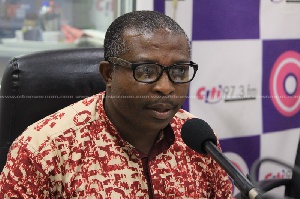Dr Alexander Abban, the Deputy Minister of Health, has called on nurses to pursue high excellence in their line of duties and be selfless in accepting postings to all areas of the country.
He implored them to put their expertise at the service of all Ghanaians, whose taxes contributed to the success of their training as professional nurses.
Dr Abban, who was speaking at the second graduation ceremony of the Schools for Peri-Operative and Critical Care Nursing, and Ophthalmic Nursing at Korle-Bu in Accra, said is very sad to observe how fresh graduates struggle for opportunities to travel outside the country to rather offer their services to others who never contributed to their training.
He said this is not morally right or fair to their benefactors,” saying “please let us feel you, let us feel your worth”.
A total of 190 graduates from both schools were awarded certificates for Bachelor of Science (BSc) degrees by the University of Cape Coast which were presented to them by Prof Kankam Buadu, the Vice Dean of the School Of Graduate Studies.
Mr Abban congratulated the graduates for their individual achievements adding that graduation was only a call to service and that both fresh and serving nursing professionals must remain committed to their oath of service.
He said the Ministry of Health (MOH) and its partners are deeply committed to providing high-quality healthcare to communities through the development of standardized manpower and the required expanded infrastructure.
Achieving Universal Health Coverage (UHC) as per the current global agenda would require wider and dedicated service of all health professionals, and though Ghana has been at the forefront of healthcare in the West African Sub-Region and “we should not compare ourselves with mediocrity,” he said.
Dr Kwaku Asante-Krobra, the Principal of the Peri-Operating and Critical Care Nursing School, said the chosen theme: “Promoting Specialist Nursing Education in Ghana,” would grant the opportunity to confront the challenge of health care with nursing specialization, to draw the awareness that Ghana cannot continue to rely on basic skills against an insufficient few specialized skills to achieve appreciable UHC.
“This is because as the literature suggests, clients seeking healthcare everywhere are safer in the hands of well-educated nurses,” he said.
However, “nurses and midwives, as well as our contributions to health care delivery, are often undervalued and we believe we could make a bigger contribution if we are enabled to work to the limit of our competence having acquired specialized education,” he said.
Dr Asante-Krobea said it is the responsibility of the government to strengthen and invest in Nursing and Midwifery for the critical workforce to have a triple impact of promoting health, advancing gender equality and strengthening local economies.
A long-term goal, he said, is to raise the profile of nursing and midwifery globally, making it central to health policy and decision making and to sure that these professionals can use their skills, education and training to full capacity.
“I dare to say that any such positive action from the government will engender public confidence in the slowly dying health system,” he added.
Dr Asante-Krobea said the Peri-Operative and Critical Care Nurses School, has been at the forefront of post-basic nursing education, having made a significant contribution to theatre and intensive care nursing spanning a period of two decades.
He said the school has produced more than 1,300 nursing and midwifery specialists whose excellence has created a conspicuous presence at various surgical theatres, recovery wards, post-anaesthetic and intensive care units in various healthcare institutions.
However, considering the current trend in Nurse Specialist deficit, Ghana requires not less than 6,000 Critical Care Nurses and 4,000 Peri-Operative Nurses to meet holistic care demand.
The Principal said the school, remains the engine that drives the passion and aspirations, as it spared no efforts to deliver its core values to train and equip specialized nurses in peri-operative and critical care with the requisite skills that serve the needs of contemporary health seekers and communities worldwide.
Mrs Stella Antwi Boasiako, the Principal, Ophthalmic Nursing School, Korle-Bu, said the institution has so far trained about 660 professionals who are working in all the districts of the country.
She called on government and its partners to support the Ophthalmic Nursing School with modern skills laboratory, a computer laboratory and student’s accommodation which were part of the requirements for the institution’s accreditation.
Health News of Saturday, 26 October 2019
Source: ghananewsagency.org
Please let us feel your worth - Minister implores nurses
Entertainment
















